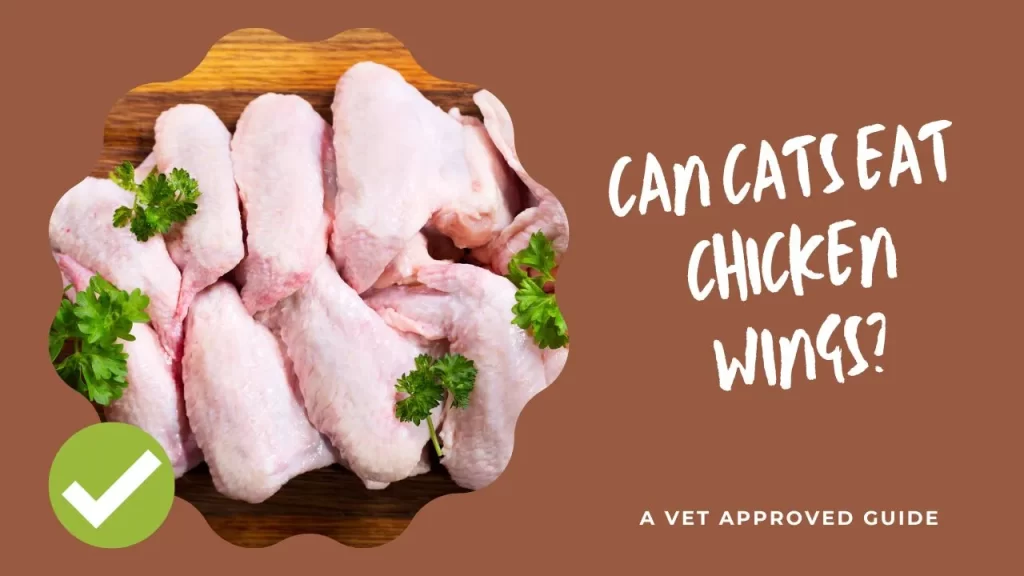Yes, cats can eat chicken wings, but only if they’re raw. Cooking the chicken wings will make the bones splinter, and that can be dangerous for your cat.
Raw chicken wings are a nutritious source of protein that your cat can safely eat.
They also help to clean off plaque and tartar buildup from your cat’s teeth.
However, you should avoid giving your cat large chicken wing bones, as they can crack your cat’s teeth or become stuck in their throat.
You can also safely feed your cat boneless chicken wings, raw or cooked.
Are chicken wings a good source of protein for cats?
Yes, chicken wings are a good source of protein for cats. Protein is essential for cats as it helps them build and maintain muscles and tissues.
On average, a chicken wing has about 9 grams of protein or 30.5 grams of protein per 100 grams.
Chicken wings also provide cats with other nutrients, such as vitamins B6 and B12.
How many chicken wings should I feed my cat?
The quantity of chicken wings to feed your cat relies on their age, weight, and activity level.
Typically, limit the intake to one or two chicken wings per week.
Prior to offering them to your cat, ensure all bones are removed.
If you’re uncertain about the suitable portion of chicken wings for your cat, consult your veterinarian for personalized guidance.
What are the risks of feeding my cat chicken wings?
There are a few risks associated with feeding your cat chicken wings.
- Choking: Chicken bones are brittle and can easily break into sharp pieces. If your cat swallows a sharp piece of chicken bone, it could lodge in their throat and cause choking.
- Internal injuries: If your cat swallows a sharp piece of chicken bone, it could also cause internal injuries, such as cuts, tears, or perforations to the stomach, intestines, or esophagus.
- Bacterial infection: Raw chicken can contain harmful bacteria, such as Salmonella and E. coli. If your cat eats raw chicken, they could become infected with these bacteria, which can cause illness.
- Weight gain: Chicken wings are high in fat and calories. If your cat eats too many chicken wings, they could gain weight and become obese.
What are the benefits of feeding my cat chicken wings?
The benefits of providing your cat with chicken wings include:
- Chicken wings provide cats with a substantial amount of protein, which plays a crucial role in developing and mending their muscles. They feature a type of protein that is superior in grade and effortlessly broken down by felines.
- Another beneficial aspect of chicken wings is that they provide various nutrients, including vitamins, minerals, and fatty acids, that are crucial for your cat’s overall health and wellness.
- Feeding your cat chicken wings can enhance their oral hygiene. By munching on chicken wings, your cat can eliminate plaque and tartar build-up from its teeth, thwarting the likelihood of dental issues.
- Feeding your cat chicken wings can enhance their fur’s well-being. The chicken wings’ fatty acids can promote a lustrous and healthy coat for your feline companion.
How should I prepare chicken wings for my cat?
Here are the steps on how to prepare chicken wings for your cat:
- Remove the bones: Chicken bones can be dangerous for cats if they are swallowed whole. They can break into sharp pieces that can cause choking, internal bleeding, or even death. Use a sharp knife to carefully remove the bones from the chicken wings.
- Cook the chicken wings thoroughly: Raw chicken can contain harmful bacteria that can make your cat sick. Cooking the chicken wings will kill these bacteria. You can cook the chicken wings in the oven, on the stovetop, or in the microwave.
- Do not add any spices or seasonings: Some spices and seasonings, such as garlic and onion, can be toxic to cats. If you want to add any flavor to the chicken wings, you can use herbs that are safe for cats, such as parsley or basil.
- Let the chicken wings cool completely before serving them to your cat: Hot food can burn your cat’s mouth.
Serve the chicken wings in a bowl or on a plate: Do not leave the chicken wings unattended, as your cat may try to eat them too quickly and choke.







